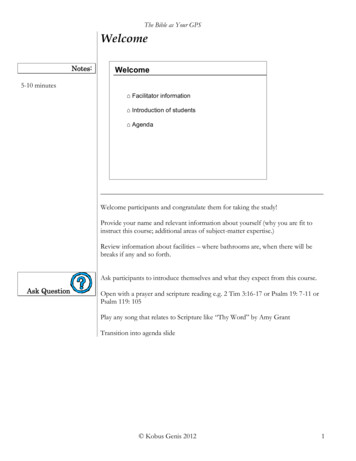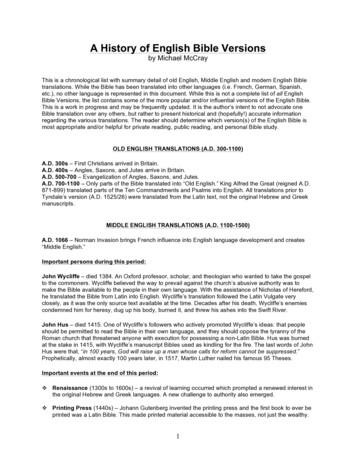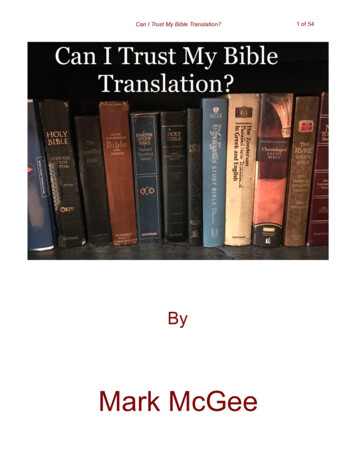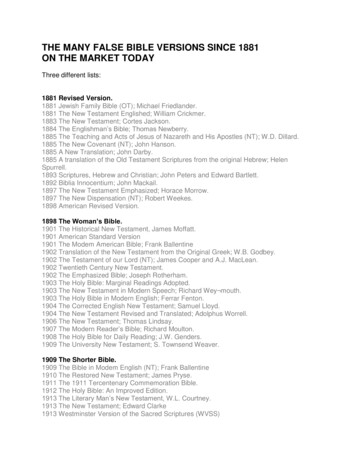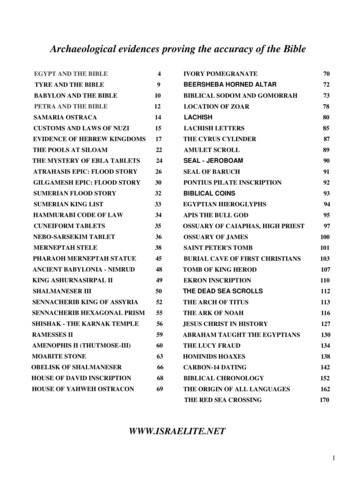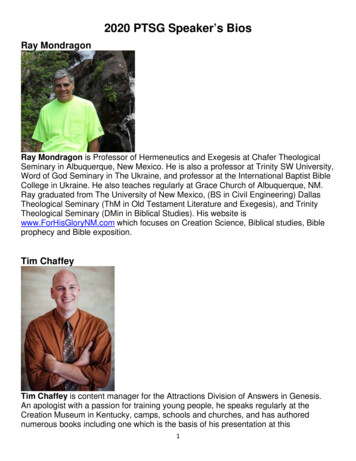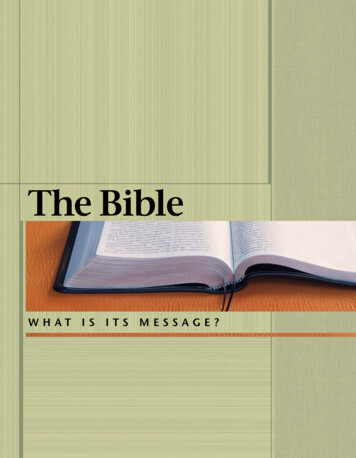
Transcription
The BibleWHAT IS ITS MESSAGE?
The BibleWHAT IS IT S MESSAGE?TABLE OF CONTENTSSectionSection1 The Creator Gives Mana Paradise [page 4]2 Paradise Lost[page 5]3 Mankind Survives theFlood [page 6]4 God Makes a CovenantWith Abraham [page 7]5 God Blesses Abraham andHis Family [page 8]6 Job Keeps His Integrity[page 9]7 God Delivers the Sons ofIsrael [page 10]8 The People of Israel EnterCanaan [page 11]9 The Israelites Ask fora King [page 12]10 Solomon Rules Wisely[page 13]11 Inspired Songs ThatComfort and Teach [page12 Divine Wisdom for Life[page 19]17 Jesus Teaches About God’sKingdom [page 20]18 Jesus Performs Miracles[page 21]19 Jesus Gives a Far-ReachingProphecy [page 22]20 Jesus Christ Is Put toDeath [page 23]21 Jesus Is Alive! [page 24]22 The Apostles PreachFearlessly [page 25]23 The Good News Spreads[page 26]14][page 15]13 Good Kings and Bad Kings[page 16]14 God Speaks Through HisProphets [page 17]15 A Prophet in ExileReceives Glimpses of theFuture [page 18]16 The Messiah Arrives24 Paul Writes to theCongregations [page 27]25 Counsel on Faith, Conduct,and Love [page 29]26 Paradise Regained![page 30]This publication is not for sale.It is provided as part of a worldwideBible educational work supported byvoluntary donations.To make a donation, please visitwww.jw.org.Unless otherwise indicated,Scripture quotations are from themodern-language New World Translationof the Holy Scriptures—With References.The Bible—What Is Its Message?April 2016 PrintingEnglish (bm-E) 2009WATCH TOWER BIBLE AND TRACTSOCIETY OF PENNSYLVANIAPublishersWatchtower Bible and Tract Society ofNew York, Inc., Wallkill, New York, U.S.A.Made in the United States of America
Why Examine the Bible?Are you familiar with the Bible? This unique work is byfar the most widely distributed book in history. People ofall cultures have found its message to be a source ofcomfort and hope and its advice to be practical for dailyliving. Yet, many today know little about the Bible.Whether you are religious or not, perhaps you are curiousabout it. This brochure is designed to give you anoverview of the Bible.BEFORE you pick up a Bible and start reading, it ishelpful to know a few things about how this bookis arranged. Also known as the Holy Scriptures, the Bible is actually a collection of 66 books, or sections, beginning with Genesis and ending with Revelation, orApocalypse.Who is the Bible’s author? That is an intriguingquestion. The fact is, the Scriptures were penned bysome 40 men over a span of about 1,600 years. Remarkably, those men did not claim to be the authors of theBible. One of the penmen wrote: “All Scripture is inspired of God.” (2 Timothy 3:16) Another of the writerssaid: “The spirit of Jehovah it was that spoke by me,and his word was upon my tongue.” (2 Samuel 23:2)The writers thus claimed that Jehovah God, the Supreme Ruler of the universe, is the Bible’s Author. God,the writers reveal, wants to be close to humans.There is something else that is essential to understanding the Bible. The Scriptures have one overalltheme: the vindication of God’s right to rule humankind by means of his heavenly Kingdom. On the pagesthat follow, you will see how this theme is a commonthread running from Genesis to Revelation.HELPFUL FACTS ABOUT THE BIBLE It was written over a period of 1,610years, from 1513 B.C.E. to 98 C.E.1 The first 39 books—written mostlyin Hebrew, with some parts inAramaic—are known as the HebrewScriptures, or “Old Testament.” The last 27 books—written inGreek—are known as the ChristianGreek Scriptures, or “New Testament.” The Bible is divided into chaptersand verses. For example, Matthew 6:9, 10 refers to the 6th chapter of thebook of Matthew, verses 9 and 10.1 There are various ways of expressing dates.In this brochure, C.E. denotes “Common Era”and B.C.E. means “Before the Common Era.”You will see this illustrated in the time line thatruns along the bottom of the pages.With the foregoing in mind, consider now the message found in the world’s most popular book, the Bible.3
esRuth1 Samuel2 Samuel1 Kings2 Kings1 Chronicles2 siastesSong of ggaiZechariahMalachiMatthewMarkLukeJohnActsRomans1 Corinthians2 1 Thessalonians2 Thessalonians1 Timothy2 TimothyTitusPhilemonHebrewsJames1 Peter2 Peter1 John2 John3 JohnJudeRevelation1 The Creator Gives Man a ParadiseGod creates the physical universe and life on earth;he creates a perfect man and woman, settles them in abeautiful garden, and gives them commands to obeyTHEY have been called the most famous opening words ever written.“In the beginning God created the heavens and the earth.” (Genesis 1:1) Withthat simple, majestic sentence, the Bibleintroduces us to the Person who is thecentral figure throughout the Holy Scriptures—the almighty God, Jehovah. TheBible’s first verse reveals that God is theCreator of the vast physical universe,including the planet we live on. Theverses that follow explain that in a series of long periods, figuratively calleddays, God went on to prepare our earthly home, bringing into existence all thewonders of our natural world.The greatest of God’s earthly creationswas man. Here was a creature made inthe image of God—able to reflect Jehovah’s own personal qualities, such as hislove and wisdom. God made man out ofthe dust of the earth. God named himAdam, then placed him in a paradise—the garden of Eden. God himself planted that garden, filling it with beautiful,fruitful trees.God saw the need for man to have amate. Using one of Adam’s ribs, Godmade a woman and brought her to theman as his wife, later named Eve. Elated,Adam burst into poetry, saying: “This isat last bone of my bones and flesh of myflesh.” God explained: “That is why aman will leave his father and his motherand he must stick to his wife and theymust become one flesh.”—Genesis 2:2224; 3:20.God gave Adam and Eve two commands. First, he directed them to cultivate and care for their earthly home andeventually fill it with their offspring. Second, he told them not to eat the fruit ofjust one tree in all that vast garden, “thetree of the knowledge of good and bad.”(Genesis 2:17) If they disobeyed, theywould die. With those commands, Godgave the man and the woman a way toshow that they accepted him as theirRuler. Their obedience would also showtheir love and gratitude. They had everyreason to accept his kindly rule. Therewas no flaw in those perfect humans.The Bible tells us: “God saw everythinghe had made and, look! it was verygood.”—Genesis 1:31.—Based on Genesis chapters 1 and 2. How does the Bible describe the creation of hu-mans and their earthly home? What kind of life did God make possible for manand woman? What commands did God give the first humanpair?THE DIVINE NAMEThe Holy Scriptures refer to Godby various titles, such as Creator andAlmighty God. Some titles stress God’sattributes, such as his holiness, hispower, his justice, his wisdom, and hislove. However, God also gave himself aunique personal name—Jehovah. In theBible as written in its original languages,this divine name appeared about 7,000times, first at Genesis 2:4. The nameJehovah means “He Causes to Become.”That is comforting to know, for it meansthat God can carry out any purpose thathe has in mind and can fulfill anypromise that he makes.4“In the beginning . . .”Adam’s creation 4026 B.C.E.
2 Paradise LostGenesis ExodusLeviticusNumbersDeuteronomyJoshuaJudgesRuth1 Samuel2 Samuel1 Kings2 Kings1 Chronicles2 siastesSong of aA rebel angel influences the first man and woman,Adam and Eve, to reject God’s rulership. As a result,sin and death enter the worldLONG before creating humans, Godcreated many invisible spirit creatures—angels. In Eden, a rebellious angel,who came to be known as Satan the Devil, slyly endeavored to tempt Eve into eating the fruit of the one tree that God hadruled out.Using a serpent, or snake, as a mouthpiece, Satan implied that God was withholding something desirable from thewoman and her husband. The angel toldEve that she and her husband would notdie if they ate the forbidden fruit. Satanthus accused God of lying to His humanchildren. The Deceiver presented disobedience to God as an appealing coursethat would lead to enlightenment andfreedom. But this was all a lie—in fact,the first lie ever spoken on earth. The realpoint at issue involved God’s sovereignty, or supreme rulership—whether Godhas the right to rule and whether he exercises it in a righteous way and in thebest interests of his subjects.Eve believed Satan’s lie. She began todesire the fruit, and then she actually atesome of it. Later she gave some to herIMPERFECTION AND DEATHGod created Adam and Eve perfect,with the prospect of living forever inParadise. When they rebelled againstGod, they sinned. Adam and Evethereby lost perfection and severedtheir relationship with the Source of life,Jehovah. From then on, they and alltheir imperfect descendants could notavoid sin and ultimately death.—Romans 5:12.husband, and he also ate it. Thus theybecame sinners. That seemingly simpleact was actually an expression of rebellion. By deliberately choosing to disobeyGod’s command, Adam and Eve rejectedthe rule of the Creator who had given them everything, including perfectlife.God called the rebels to account fortheir actions. He foretold the coming ofthe promised Seed, or Deliverer, whowould destroy Satan, the one representedby the serpent. God deferred the execution of the death sentence upon Adam and The seed “will bruiseEve for a time, thereby you in the head andshowing mercy to their you will bruise him inunborn offspring. Those the heel.”—Genesis 3:15children would have a basis for hope because theMalachiOne whom God would send would undoMatthewthe tragic consequences set in motion byMarkLukethe rebellion in Eden. Just how God’sJohnpurpose concerning this future SaviorActsRomanswould be fulfilled—and who the sent1 Corinthiansforth One would be—was gradually re2 Corinthiansvealed as Bible writing progressed.GalatiansEphesiansGod drove Adam and Eve out of ParaPhilippiansdise. Sweat and toil would be required toColossians1 Thessalonianseke out a living from the soil outside the2 Thessaloniansgarden of Eden. Eve then became preg1 Timothy2 Timothynant and gave birth to Cain, the firstTituschild of Adam and Eve. The couple hadPhilemonHebrewsother sons and daughters, including AbelJamesand Seth, the forefather of Noah.1 Peter—Based on Genesis chapters 3 to 5; Revelation 12:9. What was the first lie, and who told it? How did Adam and Eve lose Paradise? When calling the rebels to account for their ac-2 Peter1 John2 John3 JohnJudeRevelationtions, what basis for hope did God provide?5Death of Adam 30962500 B.C.E.
esRuth1 Samuel2 Samuel1 Kings2 Kings1 Chronicles2 siastesSong of ggaiZechariahMalachiMatthewMarkLukeJohnActsRomans1 Corinthians2 1 Thessalonians2 Thessalonians1 Timothy3 Mankind Survives the FloodGod destroys a wicked world but preserves Noah and his familyAS MANKIND multiplied, sin andwickedness spread rapidly in theearth. A lone prophet named Enochwarned that God would one day destroy the ungodly. Still, evil prevailedand even worsened. Some angels rebelled against Jehovah by leaving theirassigned places in heaven, assuming human form on earth, and greedily taking women as wives. Those unnaturalunions produced hybrid offspring—giantbullies called Nephilim who intensifiedthe world’s violence and bloodshed. Godwas deeply hurt to see his earthly creation being ruined.After Enoch’s death, one man stoodout in that wicked world. His name wasNoah. He and his family tried to do whatwas right in God’s eyes. When God decided to destroy the wicked people ofthat world, he wanted to protect Noahand earth’s animal creation. So God toldhim to build an ark—a huge rectangularvessel. In it, Noah and his family wouldbe preserved alive, along with numerousanimal species, through a coming globalflood. Noah obeyed God. During the decades that Noah spent building that ark,he was also “a preacher of righteousness.” (2 Peter 2:5) He warned peopleabout the coming Flood, but they ignored him. The time came for Noah andWALKING WITH GODMost of the offspring of Adam and Eve rejectedJehovah’s rulership. However, there were exceptions,starting with their faithful son Abel. Later, both Enochand Noah are said to have walked with God, meaningthat they followed a course pleasing to Jehovah.(Genesis 5:22; 6:9) Much of the Bible record focuses onmen and women who likewise chose God as their Ruler.his family to enter the ark with the animals. God shut the door of the ark behind them. The rain fell.The rain came down in torrents for 40days and 40 nights until the whole earthwas submerged. The wicked were gone.Months later, as the waters receded, theark came to rest on a mountain. By thetime the ark’s passengers could emergesafely, they had spent a full year aboard.In thanksgiving, Noah presented an offering to Jehovah. God responded byassuring Noah and his family that Hewould never again bring a flood to wipeout all life on the surface of the earth. Jehovah provided the rainbow as a visible guarantee, a reminder of this comforting promise.After the Flood, God also gave mankind some new commands. He grantedthem permission to eat the meat of animals. However, he prohibited the eatingof blood. He also commanded Noah’sdescendants to spread abroad in theearth, but some of them disobeyed. People united under a leader named Nimrodand began to build a great tower in thecity of Babel, later called Babylon. Theiraim was to defy God’s command aboutspreading throughout the earth. But Godthwarted the rebels by confusing theirone language and causing them to speakin various tongues. Unable to communicate, they abandoned the project andscattered.—Based on Genesis chapters 6 to 11; Jude 14, 15. How did wickedness spread in the earth? How did Noah prove that he was a faithful man? What prohibition did God place on mankind af-ter the Flood?2500 B.C.E.Floodwaters fall 2370
4 God Makes aCovenant With AbrahamAbraham obeys God in faith, and Jehovah promisesto bless him and to multiply his descendantsSOME 350 years had passed since theFlood of Noah’s day. The patriarchAbraham was living in the flourishingcity of Ur in what is today called Iraq.Abraham was a man of outstanding faith.But now his faith was put to the test.Jehovah told Abraham to leave thecountry of his birth and move to aforeign land, which turned out to beCanaan. Abraham obeyed without hesitation. He took along his household, including his wife, Sarah, and his nephewLot, and after the long trip became a tentdweller in Canaan. In a covenant that Hemade with Abraham, Jehovah promisedthat He would make a great nation out ofhim, that all the families of the earthwould be blessed by means of him, andthat his offspring would possess the landof Canaan.Abraham and Lot prospered, accumulating huge flocks of sheep and herds ofcattle. Unselfishly, Abraham let Lot selectwhatever territory he wished. Lot chosethe fertile district of the Jordan Riverand settled near the city of Sodom. Themen of Sodom, however, were immoral—gross sinners against Jehovah.Jehovah God later reassured Abrahamthat his offspring would become as numerous as the stars of heaven. Abrahamput faith in that promise. Yet, Abraham’sbeloved wife, Sarah, remained childless.Then, when Abraham was 99 years oldand Sarah was approaching 90, God toldAbraham that he and Sarah would have ason. True to God’s word, Sarah gave birthto Isaac. Abraham had other children,but it would be through Isaac that theDeliverer promised in Eden would come.Meanwhile, Lot and his family wereliving in Sodom, but righteous Lot didnot become like the city’s immoral inhabitants. When Jehovah determined toexecute judgment upon Sodom, he sentangels ahead to warn Lot of the impending destruction. The angels urged Lotand his family to flee Sodom and not tolook back. God then made it rain fire andsulfur on Sodom and the nearby wickedcity Gomorrah, destroying all their inhabitants. Lot and his two daughters escaped. But Lot’s wife looked back, perhaps with longing for the things she hadleft behind. For this disobedience, shepaid with her life.—Based on Genesis 11:10–19:38. Why did Abraham move to Canaan? What covenant did Jehovah make with Abra-ham? Why did Jehovah destroy Sodom and Gomorrah?A GOD OF COVENANTSIn Bible times, a covenant wasa contract or formal agreement. Bymeans of a series of covenants, whichamounted to solemn promises,Jehovah gradually revealed how hispurpose concerning the Delivererpromised in Eden would be fulfilled.The covenant made with Abrahamindicated that the promised Onewould come through Abraham’s lineof descent. Later covenants wouldshed more light on the identity ofthat One.Genesis ExodusLeviticusNumbersDeuteronomyJoshuaJudgesRuth1 Samuel2 Samuel1 Kings2 Kings1 Chronicles2 siastesSong of ggaiZechariahMalachiMatthewMarkLukeJohnActsRomans1 Corinthians2 1 Thessalonians2 Thessalonians1 Timothy2 TimothyTitusPhilemonHebrewsJames1 Peter2 Peter1 John2 John3 JohnJudeRevelation7Abraham born 20181943 Abrahamic covenant1800 B.C.E.
esRuth1 Samuel2 Samuel1 Kings2 Kings1 Chronicles2 siastesSong of ggaiZechariahMalachiMatthewMarkLukeJohnActsRomans1 Corinthians2 1 Thessalonians2 Thessalonians1 Timothy2 TimothyTitusPhilemonHebrewsJames1 Peter2 Peter1 John2 John3 JohnJudeRevelation5 God Blesses Abraham and His FamilyAbraham’s descendants prosper. God protects Joseph in Egyptknew that the One dearJEHOVAHest to him would have to suffer anddie someday. The prophecy recorded atGenesis 3:15 hinted at that truth. CouldGod convey to mankind just how dearlythat death would cost him? The Biblesupplies a living illustration. God askedAbraham to sacrifice his beloved sonIsaac.Abraham had great faith. Remember,God had promised him that the foretoldDeliverer, or Seed, would descend fromIsaac. Trusting that God would resurrectIsaac if need be, Abraham was obediently going to sacrifice his own son. But anangel from God stopped Abraham just intime. Praising Abraham for his willingness to offer up what was most preciousto him, God repeated His promises tothe faithful patriarch.Later, Isaac had two sons, Esau andJacob. Unlike Esau, Jacob appreciatedspiritual things and was rewarded. Godchanged Jacob’s name to Israel, and Israel’s 12 sons became the heads of thetribes of Israel. But how did that familyturn into a great nation?A chain of events was set in motionwhen most of those sons got jealous oftheir younger brother Joseph. They soldhim as a slave, and he was taken off toEgypt. But God blessed that faithful andbrave young man. Despite terrible hardships, Joseph eventually was singled outby Pharaoh, the Egyptian ruler, and given great authority. That was timely, for afamine caused Jacob to send some of hissons to Egypt to buy foodstuffs—and Joseph, it turned out, was in charge of allthe food! After a dramatic reunion with81800 B.C.E.Joseph sold as a slave 1750his repentant brothers, Joseph forgavethem and arranged for the whole family to move to Egypt. They were givenprime land, where they could continueto grow and prosper. Joseph understoodthat God had arranged matters in thatway in order to fulfill His promises.Aged Jacob lived out his days in Egypt,surrounded by his growing family. Onhis deathbed, he foretold that the promised Seed, or Deliverer, would be a powerful Ruler who would be born in thefamily line of his son Judah. Before hisown death years later, Joseph prophesiedthat one day God would take Jacob’sfamily out of Egypt.—Based on Genesis chapters 20 to 50; Hebrews11:17-22. What did God tell Abraham to do, and what didHe thereby convey to mankind? How did Joseph come to be in Egypt, and whatwas the outcome? What did Jacob prophesy before he died?
6 Job Keeps His IntegritySatan challenges Job’s integrity before God,but Job remains faithful to JehovahWOULD any human remain faithful to God if tested to the limit and if obedience seemed to bringno material benefits? That questionwas raised—and answered—in connection with a man named Job.While the Israelites were still in Egypt,Job, a relative of Abraham, was living inwhat is now Arabia. Meanwhile, the angels in heaven gathered before God, andrebellious Satan was among them. Before the heavenly assembly, Jehovah expressed his confidence in his loyal servant Job. In fact, Jehovah said that noother human had integrity like that ofJob. But Satan asserted that Job servedGod only because God had blessed andprotected him. Satan claimed that if Jobwere stripped of everything he had, hewould curse God.God permitted Satan to deprive Jobfirst of his wealth and children andthen of his health. Unaware of Satan’srole in all of this, Job could not understand why God allowed him to experience these trials. Still, Job never turnedagainst God.Three false friends came to Job. In a series of speeches that fill many pagesof the book of Job, the men wronglytried to convince Job that God was punishing him for hidden sins. They evenclaimed that God neither finds pleasurein his servants nor puts trust in them.Job rejected their faulty reasoning. Withconfidence, Job declared that he wouldmaintain his integrity down to death!But Job made the mistake of becoming overly concerned with justifyinghimself. A younger man named Elihu,Job’s trial before 16131600 B.C.E.who had been listening to the entire debate, spoke up. Elihu reproved Job forfailing to appreciate that the vindication of Jehovah God’s sovereignty is farmore important than the vindication ofany human. Elihu also strongly rebukedJob’s false friends.Jehovah God then spoke to Job, correcting his thinking. Pointing to manymarvels of creation, Jehovah gave Job alesson in man’s littleness compared toGod’s greatness. Job humbly acceptedthe correction from God. Jehovah, being“very tender in affection and merciful,”restored Job’s health, gave him doublehis previous wealth, and blessed himwith ten children. (James 5:11) By keeping integrity to Jehovah while under severe trial, Job successfully answered Satan’s challenge that humans will notremain faithful to God if put to the test.—Based on the book of Job. What challenge did Satan raise with regard toJob? What was accomplished by Job’s keeping his integrity to Jehovah?THE VITAL ISSUESBy asserting that Job—the mostblameless and God-fearing man thenon earth—served Jehovah God for selfishreasons only, Satan implied that thesame was true of all intelligent creatures.Satan thus raised the question of man’sintegrity to Jehovah. This is part of theoverall issue that Satan raised in Eden,namely, the rightfulness andrighteousness of Jehovah’s sovereignty.The book of Job shows that God’screatures can contribute to thevindication of Jehovah’s sovereignty bymaintaining their integrity to JudgesRuth1 Samuel2 Samuel1 Kings2 Kings1 Chronicles2 ChroniclesEzraNehemiahEstherJob PsalmsProverbsEcclesiastesSong of ggaiZechariahMalachiMatthewMarkLukeJohnActsRomans1 Corinthians2 1 Thessalonians2 Thessalonians1 Timothy2 TimothyTitusPhilemonHebrewsJames1 Peter2 Peter1 John2 John3 JohnJudeRevelation9
GenesisExodus Leviticus Numbers DeuteronomyJoshuaJudgesRuth1 Samuel2 Samuel1 Kings2 Kings1 Chronicles2 siastesSong of ggaiZechariahMalachiMatthewMarkLukeJohnActsRomans1 Corinthians2 1 Thessalonians2 Thessalonians1 Timothy7 God Delivers the Sons of Israel Jehovah plagues Egypt, and Moses leads the sons of Israel out ofthat land. God gives Israel the Law through MosesFOR many years, the sons of Israel livedin Egypt, prospering and multiplying. However, a new Pharaoh rose up.This ruler did not know Joseph. A vicious tyrant who feared the Israelites’growing numbers, he turned them intoslaves and ordered that all their newbornmales be drowned in the Nile River. Butone brave mother protected her infantson, hiding him in a basket among thereeds. Pharaoh’s daughter discovered thebaby, named him Moses, and raised himamong Egyptian royalty.When Moses was 40 years old, he gotinto trouble defending an Israelite slavefrom an Egyptian taskmaster. Moses fledto a faraway land, where he lived in exile.When Moses was 80, Jehovah sent himback to Egypt to appear before Pharaohand demand the release of God’s people.Pharaoh flatly refused. So God struckEgypt with ten plagues. Each time thatMoses appeared before Pharaoh to offerhim an opportunity to avert the nextplague, Pharaoh proved defiant, holdingMoses and his God, Jehovah, in contempt. Finally, the tenth plague broughtdeath to all the firstborn in the land—except in families who obeyed Jehovah bymarking their doorposts with the bloodof a sacrificed lamb. God’s angel of de-THE GREATEST L AWThe Ten Commandments, recorded at Exodus20:1-17, may be the best-known of the approximately600 laws given through Moses. However, when JesusChrist was asked which of God’s laws is the greatest ofall, he selected this one: “You must love Jehovah yourGod with your whole heart and with your whole souland with your whole mind and with your wholestrength.”—Mark 12:28-30; Deuteronomy 6:5.struction passed over those households.The Israelites thereafter commemoratedthis marvelous rescue by means of an annual celebration called the Passover.Having lost his own firstborn son, Pharaoh ordered Moses and all the Israelitesto leave Egypt. They immediately organized the Exodus. But Pharaoh changedhis mind. He chased after them withmany warriors and chariots. The Israelitesappeared to be trapped at the shore of theRed Sea. Jehovah parted the Red Sea, allowing the Israelites to pass through ona dry seabed, between walls of water!When the Egyptians rushed in behindthem, God let the waters come crashingdown, drowning Pharaoh and his army.Later, as the Israelites camped byMount Sinai, Jehovah made a covenantwith them. Using Moses as mediator,God gave Israel laws to provide guidanceand protection in virtually every aspect oflife. As long as Israel faithfully acceptedGod’s rule, Jehovah would be with themand would make that nation a blessing toothers.However, most of the Israelites showeda disappointing lack of faith in God. Jehovah therefore made that generationwander in the wilderness for 40 years.Then, Moses commissioned the uprightman Joshua to succeed him. Finally, Israel was poised to enter the land that Godhad promised to Abraham.—Based on Exodus; Leviticus; Numbers; Deuteronomy; Psalm 136:10-15; Acts 7:17-36. How did Moses come to be used by God to deliv-er Israel? What was the basis for the Passover celebration? How did Jehovah free the Israelites from slaveryin Egypt?1600 B.C.E.Exodus from Egypt 1513
8 The People of Israel Enter ua Judges Ruth1 Samuel2 Samuel1 Kings2 Kings1 Chronicles2 siastesSong of SolomonIsaiahE NP HOraelites left Jehovah to serve false gods.For some 300 years, the nation did notconsistently obey Jehovah’s laws. Duringthat time, Jehovah allowed Israel’s enemies, such as the Philistines, to oppressthem. But when the Israelites called toJehovah for aid, he raised up judges—12in all—to save them.The period of the Judges recounted inthe book of Judges began with Othnieland ended with Samson, physically thestrongest man who ever lived. The basic truth demonstrated over and overagain in the thrilling account recorded in the Bible book of Judgesis this: Obedience to Jehovahleads to blessings, disobedienceto calamity.—Based on Joshua; Judges; Leviticus18:24, 25. Why did Jehovah spare RahabAI LI ST IAANand her family? What did the Israelites do following the death of Joshua? What basic truth is demonstrated in the Bible book ofJudges?JerichoHNJerusalemAPENTURIES before Israel entered Canaan, Jehovah promised that landto Abraham’s descendants. Now underJoshua’s leadership, the Israelites wereabout to take possession of the PromisedLand.God had judged the Canaanites worthy of destruction. They had saturated the land with extremely degradingsexual practices as well as with wantonbloodshed. Therefore, the Canaanite cities conquered by the Israelites were to becompletely destroyed.Before entering the land, however,Joshua sent out two spies, who stayed inthe city of Jericho with a woman namedRahab. She received the spies into herhome and protected them even thoughshe knew that they were Israelites. Rahab had faith in the God of the Israelites, having heard about Jehovah’s saving acts in behalf of his people. She madethe spies swear to her that she and herhousehold would be spared.Later, when the Israelites entered Canaan and came against Jericho, Jehovahmiraculously caused the collapse of Jericho’s walls. Joshua’s t
all cultures have found its message to be a source of comfort and hope and its advice to be practical for daily living. Yet, many today know little about the Bible. Whether you are religious or not, perhaps you are curious about it. This brochure is designed to give you an overview of the



